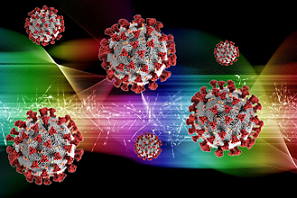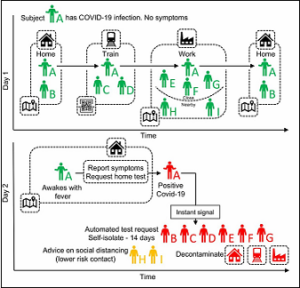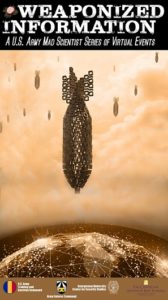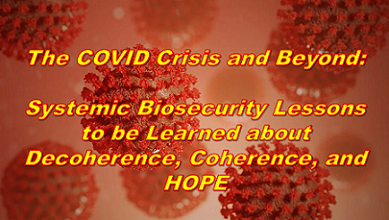[Editor’s Note: Mad Scientist Laboratory welcomes back returning guest blogger and proclaimed Mad Scientist Dr. James Giordano and newcomer Mr. John Wallbank with their timely post exploring a way forward from the systemic decoherence wrought by the ongoing COVID-19 Pandemic. With our post-industrial, digital age mindset, we often focus exclusively on the scientific and technological solutions to any given problem or crisis. Dr. Giordano and Mr. Wallbank remind us that cognitive coherence is what binds us together and is the key to resilience, enabling us to transcend adversity, confusion, and conflict. Sustaining this cognitive coherence will be essential in weathering an increasingly disruptive Operational Environment — Enjoy!]
 Humans are bio-psycho-social organisms: embodied biological systems that are embedded and nested within systems of our environments. From the physical particulate to the social structural and functional levels, the properties and mechanisms of a system’s parts both influence and are reciprocally influenced by the system(s) at-large. At the physical level, coherence refers to situations in particle or wave functions, wherein the temporal and/or spatial quantities and qualities of multiple elements of the system are in phase with every other one. Decoherence refers to the flux and degradation of field correlation and identicality by environmental influences.
Humans are bio-psycho-social organisms: embodied biological systems that are embedded and nested within systems of our environments. From the physical particulate to the social structural and functional levels, the properties and mechanisms of a system’s parts both influence and are reciprocally influenced by the system(s) at-large. At the physical level, coherence refers to situations in particle or wave functions, wherein the temporal and/or spatial quantities and qualities of multiple elements of the system are in phase with every other one. Decoherence refers to the flux and degradation of field correlation and identicality by environmental influences.  Coherence and decoherence can exert effects in and across the hierarchy of systems that are operative in biology, ecology, and the information and functions of social structures. As the current COVID crisis has brought to light, disruptions in our biology can incur effects in and across the systems that comprise our lives.
Coherence and decoherence can exert effects in and across the hierarchy of systems that are operative in biology, ecology, and the information and functions of social structures. As the current COVID crisis has brought to light, disruptions in our biology can incur effects in and across the systems that comprise our lives.
Taking the term more broadly, decoherence within and between multiple domains and dimensions can be seen in the apparent paradoxes and dilemmas that are being faced when attempting to sustain individual and public health and safety, while simultaneously preserving some sense of socio-economic stability, now and into the near future. For example, health and immunity benefit from exercise, so closures of recreational facilities need to be weighed against the positive benefits they afford. Similarly, research by Tiffany Field at the University of Miami and Martie Hazelton and Steve Cole at UCLA show how touch and close social interactions fortify our immune systems, while physical and social privation weaken its function. So, how do we guide close social interactions for the sake of our health?
For example, health and immunity benefit from exercise, so closures of recreational facilities need to be weighed against the positive benefits they afford. Similarly, research by Tiffany Field at the University of Miami and Martie Hazelton and Steve Cole at UCLA show how touch and close social interactions fortify our immune systems, while physical and social privation weaken its function. So, how do we guide close social interactions for the sake of our health?

Toward such ends, the value of testing is obvious, but serology tests also have issues of accessibility, reliability, and scope of use. This prompts the question of which tests to use. Relaxation of Food and Drug Administration (FDA) and other regulations may have been important to speeding tests to market, but ineffective tests generate problems in social dimensions. False positives are inconvenient, and can lead to misinformed strategies; but false negatives are particularly pernicious in that such results can lead to a worsening of the pandemic, and second and third waves of medical, social, and economic effects.
Part of the challenge is the tension between accessibility and precision. The most common diagnostic method of reverse transcription polymerase chain reaction (RT-PCR) amplifies part of the unique genetic signature of a pathogen so it can be reliably identified. One of the best tests shows the presence of SARS-CoV-2 in as little as five minutes and a confirmation of its absence in as little as 13 minutes.

But these methods still operate one test at a time. Recent research on other tests include one that uses a laser to get results in two minutes, and another that uses antibody-coated graphene assays to yield results in under a minute. An underused delivery system, exhaled breath condensate (EBC), shows promise in having the rich collection of viral material that comes with nasal swabs and the convenience of a saliva-based test. If these technologies can be combined and made affordable, anyone entering a venue or event could be tested — identifying those infected, immune, and/or vulnerable would be quick and easy, and activities could resume, and likely do so well before a vaccine is available. Efforts to develop other forms of testing, such as genome-wide association studies, explore associations between genes and specific traits or biochemical reactions. Their statistical analyses can then point researchers to methods for activating protective physiologic and environmental mechanisms (and mitigating those that increase vulnerability to disease).

Another option would be an at-home test taken daily, with results fed into an app that shows the individual’s status and provides them with access to venues and events. It would be convenient and solve a multitude of difficulties, although it would also generate a host of questions, issues, and problems — the extent and uses of surveillance, impositions of personal privacy, and restriction of civil liberties. Contact tracing is instrumental in curtailing outbreaks and reducing the pandemic’s overall rate of new cases. But to be effective, it needs to be initiated within two to three days of a person’s testing. Unfortunately, the duration varies considerably, with delays of two-weeks being commonplace. Once again, point-of-care and rapid-response tests can solve the problem. As it stands, a costly waste of resources is stuck in a bottleneck when the technology is available to do far better.

To be sure, the potential – and importance – of new techniques and technologies capable of mitigating this crisis is evident. But maybe of equal – if not greater – interest and concern is how we as individuals can make a contribution to such efforts. Perhaps the best resources to attain such ends are our personal character and how we use our abilities to make a positive social impact. Stellar examples of such character and ability can be seen in the courageous efforts of healthcare and other workers – and volunteers – at risk. Might such character be inculcated, and/or optimized? Through what means? To what ends?
Without doubt, there are individuals whose qualities enable them to persevere, if not “rise to the fore,” in the present conditions. Identifying these people and their characteristics may be important to better define what traits – whether innate or acquired – will be vital for leadership as we face subsequent phases of COVID, and other crises in the future. In particular, there is one type of cognitive style that appears to be advantageous. It is a sense of coherence – that quality that expresses clarity, consistency, and integrity. It holds us together as individuals and groups, even amidst factors and forces that threaten to create out-of-phase patterns that create disruptive effects throughout the domains of the individual and community systems that we comprise and to which we contribute.
Such coherence is associated with bio-psychosocial resilience and emotional intelligence. We all tend to be neurocognitively strained when confronting threat, loss, and uncertainty, and thrive when we have a sense of security and meaning. Coherence creates a bridge from one to the other by finding purpose and meaning that transcend adversity, confusion, and conflict. Indeed, coherence is more of a hard-earned shield than a magic bullet; and in this light, is strengthened by and most needed in contexts of uncertainty and strife.

There’s a time-honored adage that we cannot “buck our biology.” COVID-19 has shown this to be true. But heeding that we are “systems nested in systems,” it is of paramount importance to define, cultivate, and sustain those qualities of our being that enable our cooperation toward resilience, healing, and successful flourishing. The current crisis has renewed interest in HOPE — Health, Occupational Protection, and Enhancement. Current and near-term science and technology is providing methods and tools to identify those traits, states, and dynamics that render some more resistant, resilient, and responsive; to fortify those characteristics; and perhaps to develop them in others. In this way, we might bolster rather than buck our biology. But any such strivings must recognize and be equally responsive to the psycho-social realities in which our biologies are embedded. It may be important to “borrow” and employ constructs and functions from biology for our psychological and national health by adapting the concept of inoculation. We’re in tough times. But the confusion, conflict, and flux of decoherence can be part of a phase change to a greater strength. The caveat is to guide the process so that, as we congeal, we form in a functional rather than dysfunctional form. Ideally, we will then be both well-shaped and made more rigorous.
The domains of biology, psychology, and social engagement – and those of HOPE – are not mutually exclusive: promoting and maintaining health can and should entail protecting well-being in various occupations of our daily lives; and often such health and protections can be achieved by enabling and/or enhancing key elements of our biological, psychological, and social systems’ functions and capabilities. But such enterprises are not without issue: What traits will be “selected”? To what extent can and should these qualities and functions be optimized and augmented? Who will receive these interventions? And who will decide?

It is hard to avoid the need to stabilize and reestablish coherence when in a decoherent state, but we also can’t afford to neglect the complementary dynamic. So, let us make the most of the present moment and orient ourselves well, so our trajectory out of the COVID crisis is in a proper direction. Indeed, we function best when we function with coherence – as biological systems, as individuals, and as communities. We are social and inter-dependent creatures with cooperative and competitive relations. We need to recognize and use these character traits to cohere and deeply examine our commonality – so that we can have meaningful collaboration and new insight for our roles and responsibilities to each other. Good quality coherence fuels wisdom, which, in turn allows us to make ethically sound use of the tools and techniques we have at hand and develop the global systems in which we live.
If you enjoyed this post, check out these related posts:
“The Convergence” – COVID-19 and the Future of Bio-Security with Dr. Giordano
Persistent Disorder Strikes Back – Implications for Future Joint Force Design, by proclaimed Mad Scientist Jeff Becker
Contagion: COVID-19’s impact on the Operational Environment (Part 4) and Making the Future More Personal: The Oft-Forgotten Human Driver in Future’s Analysis by Ian Sullivan
 >>> REMINDER 1: The Mad Scientist Initiative will facilitate the next webinar in our Weaponized Information Virtual Events series next Wednesday, 29 July 2020:
>>> REMINDER 1: The Mad Scientist Initiative will facilitate the next webinar in our Weaponized Information Virtual Events series next Wednesday, 29 July 2020:
Disinformation and Narrative Warfare, featuring Dr. Ajit Maan and Mr. Paul Cobaugh of Narrative Strategies.
In order to participate in this virtual webinar, you must first register here [via a non-DoD network].
>>> REMINDER 2: If you missed participating in any of the previous Mad Scientist Weaponized Information Virtual Events — no worries! You can watch them again here [via a non-DoD network] and explore all of the associated content (presenter biographies, slide decks, scenarios, and notes from each of the presentations) here.
About the Authors:
John Wallbank, MA, is founder of Pure Hybrid Media LLC, former counselor, and a social science researcher specializing in cross-fertilized innovation.
James Giordano, PhD, is a proclaimed Mad Scientist and frequent contributor to the Mad Scientist Laboratory. He is a Professor of Neurology and Biochemistry, and Senior Scholar of the Pellegrino Center for Clinical Bioethics at Georgetown University Medical Center, Washington DC, and a Senior Fellow in Biosecurity, Technology, and Ethics at the US Naval War College.




Good article; some good points made esp some of the specified and implieds regarding how we down to the individual will manage our future(s) with either COVID or its successors as a potentially ubiquitous condition of the national operational environment. The cognitive points made are important in that millions of Americans neither know nor care about them, and act on impulse and emotion, with miniscule or nonexistent “EQ”. Therefore they are acting like those recalcitrant and dangerous Soldiers who won’t follow light, noise or radio discipline and security, and who are a danger not only to themselves but their fellow citizens. We as a collective body in academia, S&T and the defense enterprise need to train and educate people starting at very young ages on how to have higher EQs and be far better critical thinkers. How to handle emotions and fears. How to be a better citizen through consideration of others and the common good. How to spot BS. Too many facets of our society reinforce the opposite conditions, and it is causing our society grave damage. Let’s have more posts and discussions on that topic. Too many of these posts hit wavetops and don’t dig into concrete recommendations and the agencies, persons or groups to implement them. Nice to have an academic discussion but fixing problems requires action.